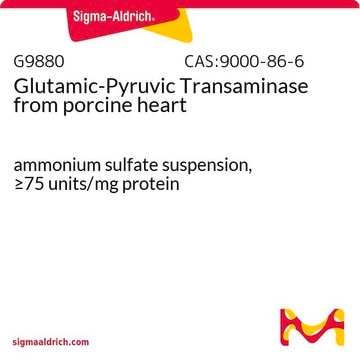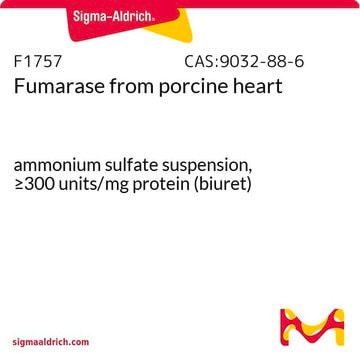G2751
Glutamic-Oxalacetic Transaminase from porcine heart
Type I, ammonium sulfate suspension, 200-500 units/mg protein
Synonym(s):
L-Aspartate:2-oxoglutarate aminotransferase, Aspartate Aminotransferase, GOT
Sign Into View Organizational & Contract Pricing
All Photos(1)
About This Item
Recommended Products
type
Type I
Quality Level
form
ammonium sulfate suspension
specific activity
200-500 units/mg protein
foreign activity
glutamic-pyruvic transaminase ≤0.03%
lactic dehydrogenase ≤0.01%
malic dehydrogenase ≤0.01%
shipped in
wet ice
storage temp.
2-8°C
General description
Research area: Cellsignaling. Glutamic-Oxalacetic Transaminase is found in all tissues and is predominant in the liver and skeletal muscle. It is a prototype of fold-type I pyridoxal 5′-phosphate (PLP)-enzymes. Glutamic-oxalacetic transaminase is a homodimer containing large and small domains in each subunit.
Application
Glutamic-OxalaceticTransaminase from porcine heart is suitable for the preparation ofphenylalanine amino acid. The immobilized form of this enzyme maybe used incomparison studies between soluble and immobilized forms in terms of reactionefficiency and stability.
Glutamic-Oxalacetic Transaminase from porcine heart has been used:
- in an enzyme-coupled assay for evaluating L-asparaginase enzyme activity
- in microtiter plate format enzyme-based assay to estimate malic acid content in berry samples
- as a supplement in homogenization buffers for the isolation of heart mitochondrial membranes in the presence of oxaloacetate (OAA)-depleting system
Biochem/physiol Actions
Glutamic-oxalacetic transaminase or aspartate aminotransferase (AAT) catalyzes the interconversion of L-aspartate and α-ketoglutarate with oxalacetate and L-glutamate. This reversible transaminase reaction is dependent on pyridoxal 5′-phosphate (PLP). Glutamic-oxalacetic transaminase maintains the nitrogen currency for metabolism by generating L-glutamate. Elevated serum levels of glutamic-oxalacetic transaminase are indicated in myocardial infarction, liver diseases, and some renal diseases.
Unit Definition
One unit will convert 1.0 μmole of α-ketoglutarate to L-glutamate per min at pH 7.5 at 37 °C, in the presence of L-aspartic acid. One unit is equivalent to ~2,000O.D. (Karmen) units at 25 °C.
Physical form
Suspension in 3.0 M (NH4)2SO4 containing 0.05 M maleate and 2.5 mM α-ketoglutarate, pH 6.0
Analysis Note
Protein determined by biuret.
Storage Class Code
11 - Combustible Solids
WGK
WGK 3
Flash Point(F)
Not applicable
Flash Point(C)
Not applicable
Personal Protective Equipment
dust mask type N95 (US), Eyeshields, Gloves
Choose from one of the most recent versions:
Certificates of Analysis (COA)
Lot/Batch Number
Don't see the Right Version?
If you require a particular version, you can look up a specific certificate by the Lot or Batch number.
Already Own This Product?
Find documentation for the products that you have recently purchased in the Document Library.
Customers Also Viewed
The Study of Serum GOT (Glutamic Oxalacetic Transaminase) Activity and Some kinetic Parameters in Patient with Pulmonary Tuberculosis
Ismahil PA and Hassan LM
Biological Chemistry, 23, 159-169 (2017)
Michael D Toney
Archives of biochemistry and biophysics, 544, 119-127 (2013-10-15)
Aspartate aminotransferase (AAT) is a prototypical pyridoxal 5'-phosphate (PLP) dependent enzyme that catalyzes the reversible interconversion of l-aspartate and α-ketoglutarate with oxalacetate and l-glutamate via a ping-pong catalytic cycle in which the pyridoxamine 5'-phosphate enzyme form is an intermediate. There
Clinical biochemistry and hematology
The laboratory rabbit, guinea pig, hamster, and other rodents., 57-116 (2012)
Anna Stepanova et al.
Biochimica et biophysica acta, 1857(9), 1561-1568 (2016-06-12)
Mitochondrial Complex II is a key mitochondrial enzyme connecting the tricarboxylic acid (TCA) cycle and the electron transport chain. Studies of complex II are clinically important since new roles for this enzyme have recently emerged in cell signalling, cancer biology
Christine B Ttcher et al.
Functional plant biology : FPB, 39(9), 745-753 (2012-09-01)
An improved understanding of the hormonal control of grape (Vitis vinifera L.) berry ripening and the ability to manipulate it are of interest scientifically and commercially. Grapes are nonclimacteric fruit with ethylene unlikely to have a principal role in berry
Our team of scientists has experience in all areas of research including Life Science, Material Science, Chemical Synthesis, Chromatography, Analytical and many others.
Contact Technical Service









